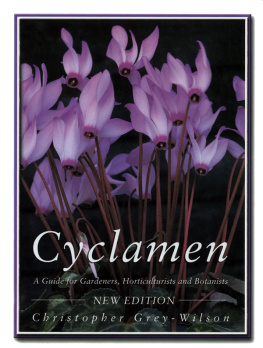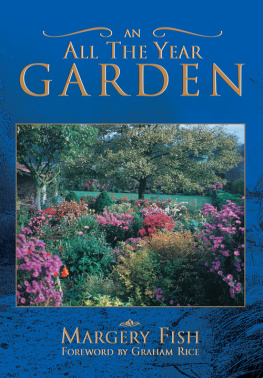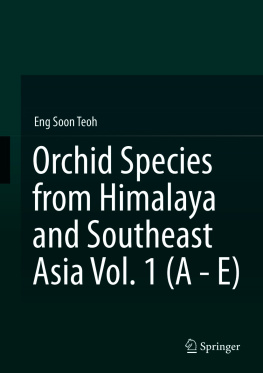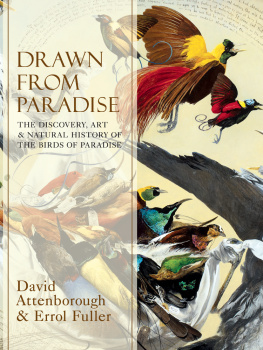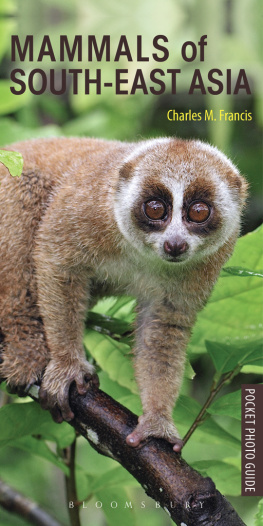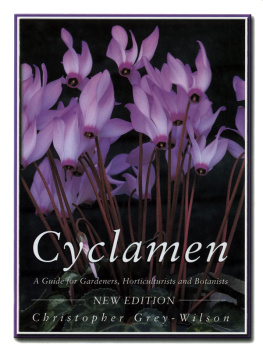A completely revised and updated edition of the most comprehensive study of the genus Cyclamen ever undertaken, this book covers species both in the wild and in cultivation, along with analyses of the many cultivars. The book is beautifully illustrated with 200 colour photographs as well as line drawings and maps showing the distribution of the various species in the wild. A chapter is specially devoted to the very important florists cyclamen, Cyclamen persicum, as well as detailed notes on cultivation and propagation.
Cyclamen have become ever more popular as garden plants, and the number of nurseries specializing in them has increased. However, in its natural habitat, the Mediterranean region and western Asia, the 22 known species of Cyclamen are increasingly under threat from development of various sorts. As a result conservation is a major issue in the study of the genus.
Cyclamen is an ideal genus for the specialist gardener, having sufficient species to make a collection worthwhile and enough variety to sustain interest throughout the year. There is great diversity in the form and colour of the flowers as well as in the shapes and patterns of the leaves. Some are hardy enough to grow unprotected in the garden, while others make excellent plants for sheltered areas and conservatories, with one or more species in flower at almost every time of the year.
This book is the best available source of information for gardeners and horticulturists, and is also invaluable to botanists and taxonomists. Using a minimum of botanical jargon, it tells all those with an interest in the subject everything that they may need or want to know about this fascinating genus.
Christopher Grey-Wilson is editor of the Alpine Garden Society and editor of The Plantsman (RHS) and is a freelance horticultural and botanical writer and photographer. For many years he was a Principal Scientific Officer at the Royal Botanic Gardens, Kew, working as a research botanist and as editor of Curtiss Botanical Magazine. He has been on a number of major botanical expeditions in pursuit of the mountain flora of Europe and Asia and is the author of several books regarded as standard works. These include Poppies and Clematis, also published by Batsford. He serves on a number of committees of the Royal Horticultural Society, who recently awarded him a Gold Veitch Memorial Medal for services to horticulture. He has been awarded gold medals by the RHS for exhibits of photographs and botanical paintings, as well as two gold medals for exhibit designs at the Chelsea flower show. The previous edition of Cyclamen was nominated for an award by the UKs Garden Writers Guild.
Cyclamen
A Guide for Gardeners, Horticulturists and Botanists

Christopher Grey-Wilson

First edition published 1997
This new revised and updated edition published 2002
Published in the United Kingdom as eBook in 2015
Christopher Grey-Wilson 2002
The right of Christopher Grey-Wilson to be identified as Author of this work has been asserted by him in accordance with the Copyright, Designs and Patents Act 1988.
eISBN 9781849942218
All rights reserved. No part of this publication may be reproduced, stored in a retrieval system, or transmitted in any form or by any means, electronic, mechanical, photocopying, recording or otherwise, without the prior written permission of the copyright owner.
Published by
Batsford
1 Gower Street
London WC1E 6HD
www.batsford.com
An imprint of Pavilion Books Company Ltd
ACKNOWLEDGEMENTS
I am deeply grateful to all those who have assisted in one way or another in the production of this new edition, in particular Chris Brickell, Chris Clennett, John Fielding, John Grimshaw, Rod and Jane Leeds, Alan Leslie, Brian Mathew, Peter Moore, Robert Rolfe, and Bob and Rannveig Wallis. In addition, many members of both the Alpine Garden Society and the Cyclamen Society have provided notes and information over the years: to all I am hugely thankful. Finally, many thanks to Alan Radcliffe-Smith for providing the Latin diagnoses included in this book. C.G-W
PICTURE CREDITS BY PLATE NUMBER
The page numbers refer to the print edition.
[Photos by the author unless otherwise stated]
AGS Slide Library (Mike Ireland) 26
Bob Charman 68
John Fielding 29, 56, 65, 66, 69, 76, 79, 81, 92, 111, 118, 122, 123, 136, 154, 158, 159, 169, 193, 196, 199
Gerald Firak 120
Ronald Frank 52
Doug Joyce 13, 48, 67, 91, 99
Rex Mark 15, 117
Brian Mathew 140
Robert Rolfe 12, 14, 59, 60, 62, 73, 74, 139
Sakata (Japan) 174
Sahin (Holland) 196
Eddie Simpson 25
Bob Wallis 63, 75, 90, 94, 95, 96, 141
Contents
Introduction
I t is always nice to produce a new edition of a book. I have spent a great deal of time over the years looking at cyclamen, both from a botanical as well as a horticultural point of view. Since the last edition of this work (published in 1997) a surprising amount of new material has come to light to augment our previous knowledge. New DNA investigations into some species and groups have been initiated and there have been further cladistic analyses. Besides this, more extensive fieldwork has been undertaken, both by me and more especially through a series of expeditions sponsored by the Cyclamen Society. I have tried to assimilate as much of this new information as possible. As a result there has been a number of changes in the overall circumscription of the species and in their relationship to one another.
In recent years cyclamen have become increasingly popular in our gardens with a number of nurseries specializing in their cultivation. The thriving Cyclamen Society bears witness to this increased awareness. Interestingly, the popularity of species cyclamen is a particularly British phenomenon and has been so for more than one hundred years. Although there is a growing interest in Continental Europe, the US and elsewhere for the species, it has been the development of the numerous cultivated forms of C. persicum that has predominated. Today in countries like France, Germany, the Netherlands, Italy, Switzerland and Japan C. persicum is a very important flower crop produced in many millions as a pot plant.
At the same time as updating the text, I have been able to add quite a few new images of both species and cultivars in an attempt to show the great diversity of flower and form found in the genus. Cyclamen as it is now understood consists of 22 species. It might seem surprising to some that this relatively small genus can occupy such a lot of attention, but our knowledge about these charming little plants continues to expand and more and more people are being captivated by them. I am quite sure that we still have much more to discover both about the species in the wild and about the species and the many forms and cultivars in cultivation.
Important changes in nomenclature that affect both gardeners and botanists are:
the recognition of C. elegans as a distinct species (formerly C. coum subsp. elegans)
the upgrading of C. repandum subsp. peleponnesiacum to species now C. pelopennesiacum
the reinstating of the name C. alpinum which replaces C. trochopteranthum
This I am quite certain will not be the last word on the species, for the taxonomy of any genus evolves as our knowledge on the subject increases. However, I hope that my approach has been both consistent and reasonably logical. I state this in the full knowledge that no revision can ever fully satisfy every reader.
Next page
